Interrogative SentenceAn interrogative sentence implies to the sentences that post questions. It can be utilized to ask a variety of questions, ranging from why somebody did something to what they have been up to recently. 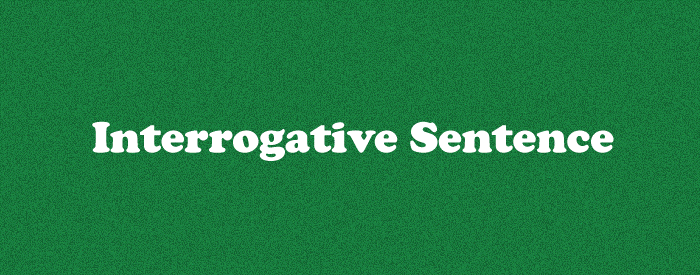
Interrogative sentences contain question marks and pose a query. Sentences in English have been categorized into four groups based on their function. An interrogative statement is one of them, and in this post, we will study about the various sorts of interrogative sentences as well as an example to help us comprehend the concept better. In principle, an interrogative sentence poses a direct question and begins with a capital letter, and concludes with a question mark. The interrogative sentence has a subject-predicate inversion, which implies that the verb appears before the subject. Interrogative Sentences and Their ApplicationsThis type of statement is frequently used to gather information, seek something, or make suggestions. We can ask someone to do something by using the interrogative statement. We can better grasp it if we use verbs like shall, Can, may, and so on.
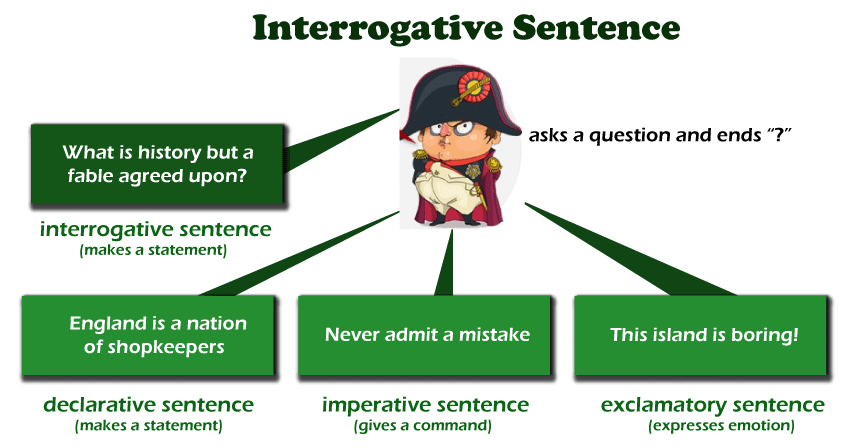
How to Compose an Interrogative SentenceThe predicate and primary verb are usually placed prior to the subject in interrogative phrases. In the sentence "Who was the final presenter?" for example. The interrogative pronoun or question word is "who," the basic verb is "was," and the subject is "the last presenter." Auxiliary verbs can also be used in interrogative statements, such as "Did she plan to speak so angrily?" The auxiliary verb (or assisting verb) "did" here turns the statement "she implied to seem so angry" into a question. 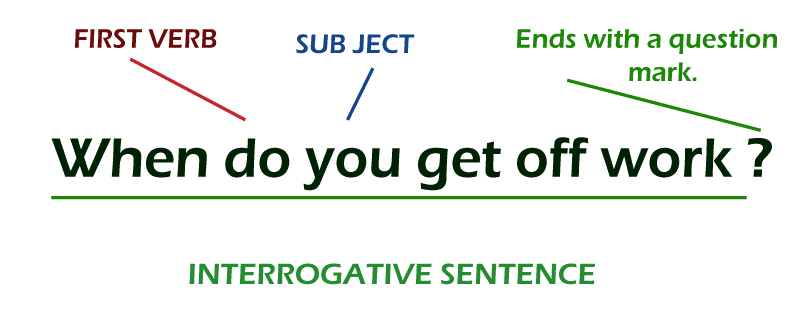
Types of Interrogative SentencesFour forms of interrogative sentences have already been identified.
Wh-Interrogatives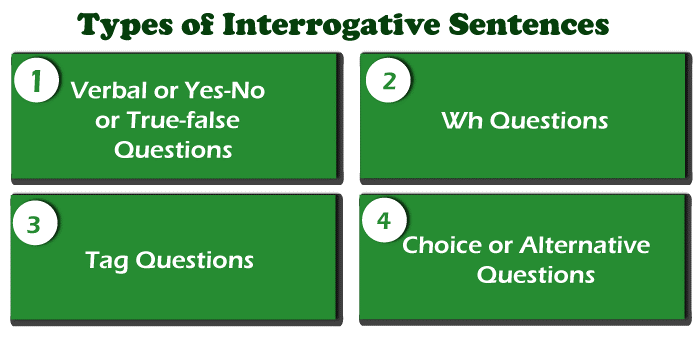
This question begins with the query words. The interrogative word, often known as the question word, pertains to the function work that assists in asking a question. In the English language, there are nine question words called as wh-words since, with the exception of "how," all other question words begin with the letter wh-. Question WordsWhen, why, and who? The terms which, what, where, whom, whose, and how are referred to be inquiry words since they are frequently employed to enquire about a query. These words could be an object, a subject, an adverb, or a compliment. Questions That Begin With The Term "Who""Who" implies to an individual, and it does not come prior a noun since it is a pronoun. When the object is "who," we can use whom alternatively; however, the "who" query word is extremely prevalent in everyday discourse. Examples:
Questions Begin With "Where."To obtain information about a location or position, we employ "where" as an adverbial that may be the object of a preposition. Examples
Questions That Start With "When."When determining the occasion, time, etc., "when" is utilized. Examples:
Questions Beginning With "Why" And "Why Don't""Why" and "why don't" questions are used to comprehend the reason or seek a reasoning; nevertheless, ", why don't "is used to make a suggestion. Examples:
Questions That Begin With "What.""What" is a pronoun that can refer to either a subject or an object. We must realize that if the question terms are the subject, there will be no reversal of the subject and verb. Examples:
Questions Beginning With "Which""Which" can also be utilized as a pronoun and determiner. Examples:
Questions Beginning With "Who""Whose" pertains to the possessive form of the pronoun, i.e. "who." Examples:
Questions That Commence With The Word "How""How" is utilized to ask both direct and indirect direct inquiries in order to gain vital information about the amount of distance required to describe the degree level. Examples:
Alternate InterrogativesThese are the queries that give the listener the option of choosing two or more answers to the inquiry. Examples:
Interrogatives with Yes/No AnswersThese are the questions that can be addressed with "yes" or "no." These kinds of queries can be made by employing auxiliary verbs, Examples:
Questions About TagsThese questions are created by appending question tags to the conclusion of declarative phrases. When the sentence is affirmative, the negative tag is added, and vice versa. Examples:
Indirect Or Imbedded QuestionsWe can say that certain declarative phrases include embedded questions that should not be interpreted as questions, and question marks must not be used at the conclusion. However, if the indirect question is within the question, the question mark must be placed at the conclusion. Examples: Could you tell me the location of the department store? ("Where is the departmental store?" is integrated in the question, thus a question mark is added at the end. Why Are Interrogative Sentences Important?Interrogative sentences are essential. They are the means by which we obtain the knowledge we seek. Interrogative sentences are the second most prevalent sentence form after declarative sentences (which express statements). As a result, understanding how they are generated is critical if you are studying or teaching English. Interrogative sentences are rarely to be the cause of any major writing problems if you are a native English speaker. Nonetheless, there are two compelling reasons to reconsider interrogative phrases. 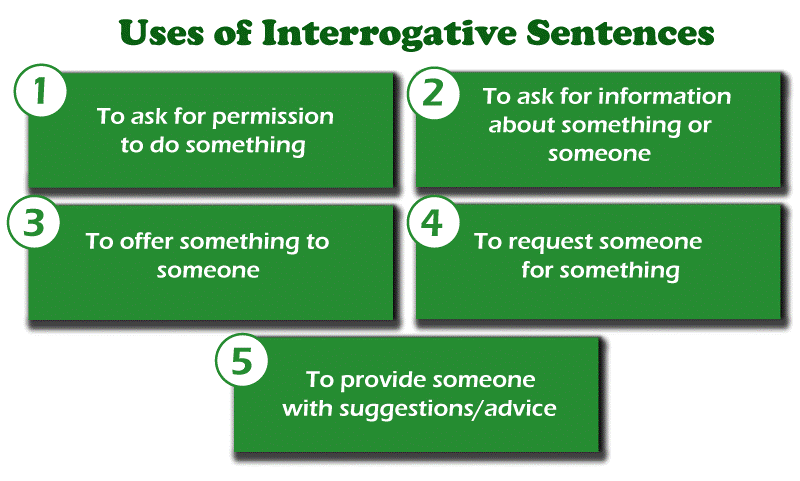
(Reason 1) Never use a question mark following a non-question. (Watch out for indirect questions!) Interrogative statements (i.e., questions) do not cause major problems amongst native English speakers who comprehend how to compose the three sorts of questions. The most common problem with interrogative sentences is when writers mistake a non-question for a question and use a question mark.
(These are statements, not queries.) They should be followed by periods (full stops). This issue is most commonly seen when the statement involves an indirect inquiry. A direct question contained within a statement or another question is referred to as an indirect question. The embedded direct questions, in this case, are "Is it completed?" and "Will I ever find my flashlight?" Understand more about indirect questions. (Reason 2) Ask a rhetorical question to bring up a topic. Rhetorical questions (those that do not generate an answer) can be used to convey a point or for introducing the subject. When are you going to be happy enough to have children? (This is a rhetorical question intended to convey a point instead of elicit an answer.) It's a novel way of saying "You're never secured enough to have children." Is the Loch Ness creature still alive? (This is a rhetorical question intended to initiate a subject.) Rhetorical questions, which are frequently used as titles, are intended to spark the audience's curiosity.) ConclusionIn everyday language, interrogative statements are used to pose a direct question, enquire about details, or request something. There are various forms of questions that can be made by employing 'wh'-words and auxiliary verbs. To signify an interrogative statement, the verb must come prior to the actual subject and be followed by a question mark.
Next TopicInterrogative Sentence Examples
|
 For Videos Join Our Youtube Channel: Join Now
For Videos Join Our Youtube Channel: Join Now
Feedback
- Send your Feedback to [email protected]
Help Others, Please Share









